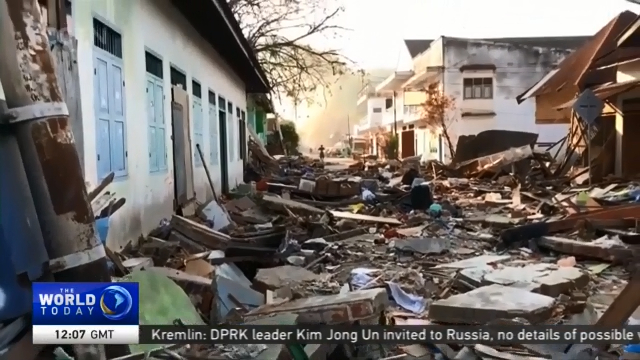
20:43, 08-Oct-2018
Indonesia Quake-Tsunami: Palu residents still in post-quake trauma
Updated
20:00, 11-Oct-2018
02:22

Ten days after the earthquake and tsunami hit Indonesia's island of Sulawesi, people are trying to restore their lives. In Palu, the worst-hit city, conditions are improving but many are still traumatised. Our correspondent Miro Lu files this story from Palu city.
Residents in Palu are no stranger to earthquakes. Indonesia, which sits on the Pacific Ring of Fire, is one of the most disaster-prone countries in the world. Palu city is located on a fault-line named after itself, Palu-Koro fault. But this time, it was too hard to swallow even for the experienced ones.
AIS FOUNDER OF JAMBATA ORGANIZATION "After 5 pm, the earthquake happened and felt very strong; it lasted for 5 minutes. At the time of the earthquake I was in a shop on Tadulako Street, nobody could stand and we all tried to crawl to get out on the road. Outside was chaos, there were many motorbikes falling. People were panicking. I saw a mother and her child fall into a ditch."
At least for AIS and his family, they didn't lose anyone and their house is still standing, unlike their neighbours'.
Most of the homes in this neighbourhood are now empty, showing traces of a normal life before people fled to seek refuge outside of Palu city. For the ones that stayed, all they can think about is what happened on September 28th. AIS's wife Hartina still can't go to the bathroom, because it was there she experienced the horrifying earthquake.
AIS FOUNDER OF JAMBATA ORGANIZATION "People who live on Jalan Zebra and Kijang built the tent on the open space during the first day of the earthquake. Some others went to the airport, hoping to be evacuated using military planes. During the 1st and 2nd day, there were still many people in this neighbourhood. Starting on the 3rd day, people left, around 80% left."
MIRO LU PALU "Ten days after the earthquake struck this middle-class neighbourhood, two kilometres from the airport, 80 percent of the houses are still empty. Although conditions are improving slowly, resident like AIS and his family are traumatised. Many still sleeping in the open and it might take months to get back to normal. Miro Lu for CGTN at Palu City."

SITEMAP
Copyright © 2018 CGTN. Beijing ICP prepared NO.16065310-3
Copyright © 2018 CGTN. Beijing ICP prepared NO.16065310-3